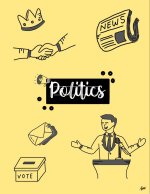Politics isn’t just about elections, politicians, or heated debates on news channels. It is the driving force that shapes our society, economy, rights, and future. Whether we realize it or not, politics affects every citizen — from the price of daily essentials to the freedom we enjoy and the laws we follow.
Why Politics Matters
Many young people often believe that politics is a messy, corrupt, or distant affair that doesn’t concern them. But the truth is, political decisions decide the quality of education we get, the healthcare facilities available, the job opportunities created, and even the taxes we pay. Ignoring politics means giving others the power to decide your future without your input.
The Role of Youth in Politics
India is one of the youngest nations in the world, with over 65% of its population below the age of 35. Yet, political participation among youth remains limited mostly to voting, with very few engaging in policymaking, activism, or governance. Imagine the change we could drive if more educated, aware, and responsible young minds actively participated in the system.
Politics: Not Just About Politicians
Politics is broader than elections or political parties. It includes civic duties like voting, protesting, questioning, volunteering, or engaging in community welfare. It’s about understanding how government policies affect marginalized communities, the environment, and the nation’s growth.
Challenges in Modern Politics
Modern politics faces serious challenges — misinformation, hate speech, corruption, and polarisation. Social media, while powerful, often amplifies fake narratives, dividing people on the basis of religion, caste, or ideology. This makes it even more crucial for citizens to be informed, rational, and conscious about the sources they trust.
Towards Responsible Citizenship
Being politically aware does not mean supporting a particular party blindly. It means understanding issues, asking questions, holding leaders accountable, and voting based on policies, not propaganda. A healthy democracy thrives when its citizens are active participants, not silent observers.
Conclusion
Politics is not a dirty game unless we leave it to be played by the wrong hands. It is a tool for change, for progress, and for building a better future. When citizens, especially the youth, step forward with awareness and integrity, politics transforms from a battlefield of power to a platform of pro
gress.
Why Politics Matters
Many young people often believe that politics is a messy, corrupt, or distant affair that doesn’t concern them. But the truth is, political decisions decide the quality of education we get, the healthcare facilities available, the job opportunities created, and even the taxes we pay. Ignoring politics means giving others the power to decide your future without your input.
The Role of Youth in Politics
India is one of the youngest nations in the world, with over 65% of its population below the age of 35. Yet, political participation among youth remains limited mostly to voting, with very few engaging in policymaking, activism, or governance. Imagine the change we could drive if more educated, aware, and responsible young minds actively participated in the system.
Politics: Not Just About Politicians
Politics is broader than elections or political parties. It includes civic duties like voting, protesting, questioning, volunteering, or engaging in community welfare. It’s about understanding how government policies affect marginalized communities, the environment, and the nation’s growth.
Challenges in Modern Politics
Modern politics faces serious challenges — misinformation, hate speech, corruption, and polarisation. Social media, while powerful, often amplifies fake narratives, dividing people on the basis of religion, caste, or ideology. This makes it even more crucial for citizens to be informed, rational, and conscious about the sources they trust.
Towards Responsible Citizenship
Being politically aware does not mean supporting a particular party blindly. It means understanding issues, asking questions, holding leaders accountable, and voting based on policies, not propaganda. A healthy democracy thrives when its citizens are active participants, not silent observers.
Conclusion
Politics is not a dirty game unless we leave it to be played by the wrong hands. It is a tool for change, for progress, and for building a better future. When citizens, especially the youth, step forward with awareness and integrity, politics transforms from a battlefield of power to a platform of pro
gress.

